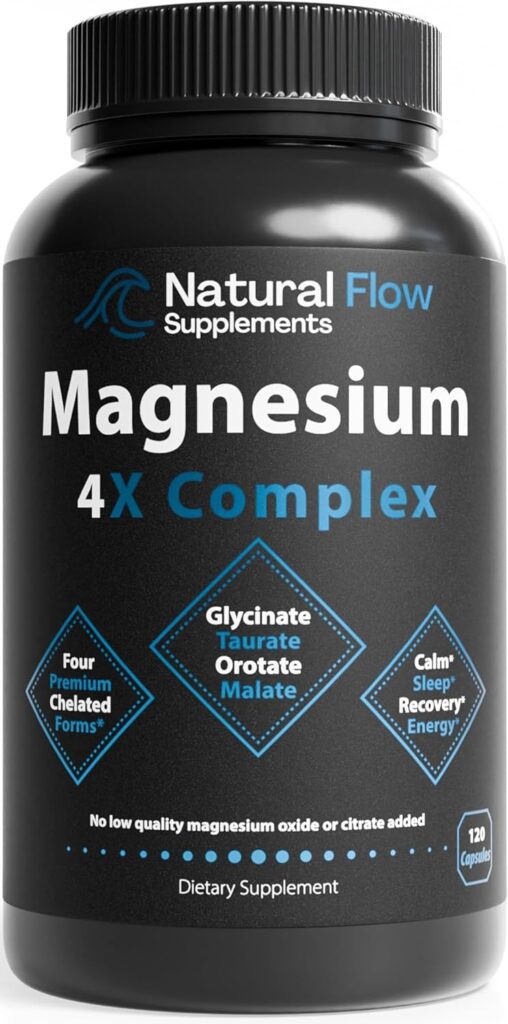Anxiety can affect anyone, from occasional stress to chronic feelings of worry and tension.
It can interfere with your daily life, sleep, and overall well-being.
While professional support is important for severe anxiety, there are natural ways to help calm your mind, support your nervous system, and reduce anxious feelings.
In this post, we will explore 5 natural ways to ease anxiety, starting with its causes.
Let’s dive in!
What Causes Anxiety?
Anxiety can result from a combination of factors, including genetics, brain chemistry, stress, lifestyle habits, and certain medical conditions.
Environmental triggers, lack of sleep, poor nutrition, and nutrient deficiencies (like low magnesium levels) can also contribute to heightened anxiety.
Symptoms can include rapid heartbeat, restlessness, racing thoughts, difficulty concentrating, and muscle tension.
5 Natural Ways to Ease Anxiety
1. Magnesium Complex
Magnesium is a vital mineral that helps regulate the nervous system and promotes relaxation.
Taking a high-absorption magnesium supplement can support healthy neurotransmitter function and can help reduce the physical symptoms of anxiety, like muscle tension and restlessness.
Magnesium also aids in better sleep, which is essential for managing stress and anxiety.
Out of all of the magnesium supplements I’ve tried, Natural Flow’s 4x Magnesium Complex is my personal favorite.
Natural Flow’s magnesium is my top choice for anxiety support because it combines four highly absorbable forms of magnesium (glycinate, taurate, malate, and orotate) to maximize relaxation and nervous system balance.
With added taurine, glycine, and malic acid, it helps calm the mind, reduce tension, and promote better sleep, all of which are essential for supporting anxiety naturally.
Simply take 2 capsules per day and you’re good to go!
2. Mindfulness and Meditation
Practicing mindfulness or meditation daily can calm racing thoughts and create a sense of inner peace.
Even just 10–15 minutes of focused breathing or guided meditation can help reduce cortisol levels, slow your heart rate, and decrease feelings of anxiety.
3. Regular Physical Activity
Exercise is a natural stress reliever that releases endorphins, the body’s feel-good hormones.
Activities like walking, yoga, swimming, or strength training can help lower anxiety levels, improve mood, and promote overall mental well-being.
Consider working out for about 3-4 hours per week for the best results.
4. Limit Stimulants
Caffeine, sugar, and alcohol can exacerbate anxiety symptoms by increasing heart rate and stress hormone levels.
Reducing or moderating these substances can help calm your nervous system and prevent spikes in anxious feelings.
Consider cutting caffeine 6-10 hours before bed to help with quality sleep as well.
5. Deep Breathing Exercises
Deep, slow breathing activates the parasympathetic nervous system, helping your body shift from a state of stress to relaxation.
Techniques like diaphragmatic breathing, box breathing, or the 4-7-8 method can be practiced anytime you feel anxiety creeping in.
Ease Anxiety
Anxiety is a complex condition, but natural strategies can provide meaningful relief.
Magnesium supplementation, mindfulness, exercise, avoiding stimulants, and deep breathing techniques all support a calmer mind and healthier nervous system.
By incorporating these practices into your daily routine, you can manage anxiety more effectively and enjoy greater emotional balance and well-being.
Thank you for reading!
Affiliate Disclosure
Some of the links on this site are affiliate links. This means that if you click on the link and purchase the item, we may receive an affiliate commission at no extra cost to you. I only recommend products or services that I believe will add value to my readers, however, some (not all) do pay us to be on this blog. Your support and theirs help keep this blog running, and I genuinely appreciate it.
Medical Disclaimer
The information provided on this website is for educational purposes only and is not intended as medical advice. This blog or the writer is not a licensed healthcare professional, and the content should not be used as a substitute for professional medical diagnosis, treatment, or advice. Always consult with your physician or other qualified healthcare provider before starting any new treatment or making any changes to your healthcare routine.
